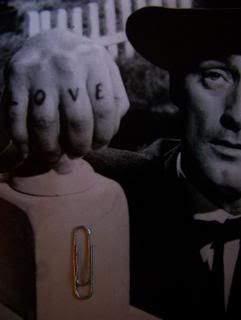Josh,
It's funny, I've been thinking of what you wrote here, actually not thinking, but more likely gestating without responding, and today, out of the blue, I wrote an
annotation on the very topic you write about below, re: strangeness and familiarity. To me, it's a matter of scale and, well, Miranda July.
Yes, you went away to Mexico, I went away a few times to New York, and now we re-convene and I'm still talking about Miranda July.
My wife says: Miranda July this, Miranda July that! Why don't we just find Miranda July and fuck her, me and you together?
Actually, my wife doesn't say that at all, but isn't it pretty to think so? (Do Hemingway quotes pop into your head at inappropriate times too? Bastard, he's seeped into me--too much early training in canon, not enough marginalia.)

Anyway, in an interview for
bookslut.com Miranda July was asked what her collection of short stories
No One Belongs Here More Than You might have to say about “our human existence, our minor existence, on this big planet.”
She answered: “I guess…there’s something always interesting to me about scale and how you can get to the universe through sort of the tiniest things and vice
versa.”
July’s response puts me in mind of her narrator from the story “Making Love in
2003”. She—the narrator—is a goofy, sentimental young woman who makes love, first, as high-school student, with a dark shape, and later, as a special needs assistant, with one of her students. Love, and making love, for her,
is the universe. She longs for, and lives for, a love connection and her need is displayed in the most idiosyncratic, goofy ways: She sits around other people’s houses; she drives around, without purpose; she confiscates other people’s hand-written notes. The whole time she thinks about love.
And this is what
I love about Miranda July: she writes about the great universal theme, love, via the utterly mundane, and in doing so she reminds us that the mundane is precisely the scene of the extraordinary.
Early in “Making Love in
2003” July’s narrator is sitting around a woman’s house waiting for the woman’s husband to come home. The woman’s husband once told her she had “promise” as a writer, so the narrator wrote every day for a year with his business card attached to her computer. Now she is finished and she is sitting in the husband’s living room with his wife waiting to present the book to him. She scoffs at the wife and she wonders what the husband will do with her: “Will he kiss me?”
The narrator is mystified by a collection of needlepoint pillows. One says: MAKING LOVE IN 2003. Another says: MAKING LOVE IN 1997. The pillows seem weird and creepy to the narrator. Then she learns that the woman is actually Madeleine L’
Engle, the famous author. This bit of knowledge hits the narrator with a bout of cosmic consciousness. Suddenly, where she once saw creepiness, she now sees the extraordinary love between Madeleine L’
Engle and her husband:
"I looked around the living room. This was Madeleine L’
Engle’s living room. MAKING LOVE IN 2002. MAKING LOVE IN 1997. I looked at her tailored brown pants and realized he was probably making love to her right this second. When you reach a certain saturation point, lovemaking becomes one endless vibration. He was running late, and this was his way of making love to her, and she wanted to write but had to entertain me instead, and this was her way of making love to him. I was just a part of the love-making between Madeleine L’
Engle and her husband. A tiny part of MAKING LOVE IN 2003."
This quote jumps from the mundane to the cosmic back to the mundane in a matter of three lines, from brown pants, to an endless vibration, to a man running late. July’s sense of scale here is enormous, and yet she seems to be saying: do not be fooled by scale, it has nothing to do with size. The grand endless vibration of love does not need a grand image to match: it can be seen easily in a collection of needlepoint pillows. The needlepoint pillows, in fact, purposefully temper July’s grand, vibrating gesture; by conflating her cosmic image with a mundane image, July gives the reader something to chew on, something familiar to taste and in doing so she not only illuminates love in a new way, but pillows too.
I think this is what you call the "squishy ridiculousness of life." I call it The How Goofy and Horrible is Life Quotient. Yes, it is both: goofy and horrible.
Another quotient I've been thinking about: The Joy Quotient. What if we're given an endless amount of joy to spend each day, like a wallet with an endless supply of twenties? If we don't use it we waste it. But it's there and the supply is endless.
So I'm starting to think like Richard Pryor in
Brewster's Millions.
I mean after all, there's pillows and stuff like that. So much.
What the hell do I have to lose?




1 comment:
Sometimes things look better when you look at them differently. Here:maybe this book is not a masterpiece, but certainly it is worth a read or two even if you’re not really reading but only looking at your hands…i really don’t think Miranda July would mind.
Post a Comment